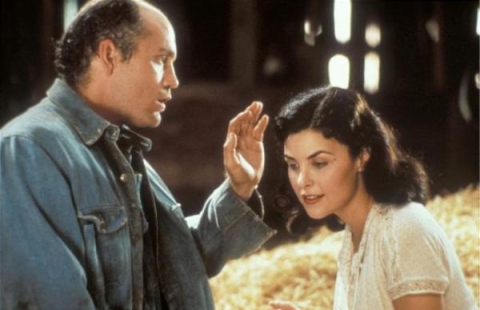Wednesday
What John Steinbeck character does Facebook remind you of? By the above picture, you may have arrived at the answer I have in mind, but the question still remains why.
According to Wired, an employee made the comparison after Facebook was weaponized by Trump and hijacked by the Russians in the 2016 election:
For the first time, insiders really began to question whether they had too much power. One employee told WIRED that, watching Zuckerberg, he was reminded of Lennie in Of Mice and Men, the farm-worker with no understanding of his own strength.
Wired provides a detailed account of how the Trump campaign and the Russians used Facebook to spread fake stories. While many thought that Hillary Clinton had the more sophisticated network operation, they didn’t count on the Trump’s use of existing social media:
Over the course of the summer, Trump’s team turned the platform into one of its primary vehicles for fund-raising. The campaign uploaded its voter files—the names, addresses, voting history, and any other information it had on potential voters—to Facebook. Then, using a tool called Lookalike Audiences, Facebook identified the broad characteristics of, say, people who had signed up for Trump newsletters or bought Trump hats. That allowed the campaign to send ads to people with similar traits. Trump would post simple messages like “This election is being rigged by the media pushing false and unsubstantiated charges, and outright lies, in order to elect Crooked Hillary!” that got hundreds of thousands of likes, comments, and shares. The money rolled in. Clinton’s wonkier messages, meanwhile, resonated less on the platform. Inside Facebook, almost everyone on the executive team wanted Clinton to win; but they knew that Trump was using the platform better. If he was the candidate for Facebook, she was the candidate for LinkedIn.
“By the end of the campaign,” Wired’s authors point out, “the top fake stories on the platform were generating more engagement than the top real ones.”
Now to Lennie. In the following scene, feel free to think of Curley’s wife as Hillary:
She struggled violently under his hands. Her feet battered on the hay and she writhed to be free; and from under Lennie’s hand came a muffled screaming. Lennie began to cry with fright. “Oh! Please don’t do none of that,” he begged. “George gonna say I done a bad thing. He ain’t gonna let me tend no rabbits.” He moved his hand a little and her hoarse cry came out. Then Lennie grew angry. “Now don’t,” he said. “I don’t want you to yell. You gonna get me in trouble jus’ like George says you will. Now don’t you do that.” And she continued to struggle, and her eyes were wild with terror. He shook her then, and he was angry with her. “Don’t you go yellin’,” he said, and he shook her; and her body flopped like a fish. And then she was still, for Lennie had broken her neck.
Facebook co-founder and CEO Mark Zuckerberg may not be as clueless as Lennie, but for the longest time he couldn’t face up to reality, at one point saying,
The idea that fake news on Facebook—of which, you know, it’s a very small amount of the content—influenced the election in any way, I think, is a pretty crazy idea.
Fortunately, Zuckerberg now acknowledges his strength and wants to clean up the mess. Unlike George, he will not shoot Lennie for his own good—he still wants Facebook to build “a global community”—but he wants to “knock out false news and clickbait.” To that end, he is searching for ways to monitor posted articles. Wired observes,
Of course it’s a platform, and always will be. But the company also realizes now that it bears some of the responsibilities that a publisher does: for the care of its readers, and for the care of the truth. You can’t make the world more open and connected if you’re breaking it apart. So what is it: publisher or platform? Facebook seems to have finally recognized that it is quite clearly both.
Are better days ahead? Here’s George’s assuring Lennie of a beautiful future:
Look down there acrost the river, like you can almost see the place.
I’m willing to believe that Zuckerberg wants what is best for the country. Like George, however, he has some very hard choices ahead of him. Some of the killing would include ad revenue.


